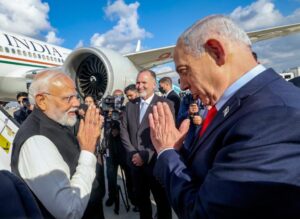Trump And The Changing Global Order

For decades after World War II, the world was one of known unknowns. Trump has rapidly made it one of unknown unknowns (Photo by Gage Skidmore/Flickr/CC BY-SA 2.0)
The new US president’s disruptive acts have left countries reeling as time-honoured ways of doing things change in unexpected ways. How best can they respond?
The world used to be a familiar place, but then along came Donald Trump. Since the end of World War II, people around the world have come to expect certain things, and certain ways of doing things. It’s not that the world has not changed since 1945, but the change was largely predictable. As another Donald, erstwhile US Secretary of Defense Donald Rumsfeld, famously said, there were known unknowns and unknown unknowns. We were in a world of known unknowns. Now it seems as though we are in a world of unknown unknowns.
Since the middle of the last century, there has been a general acknowledgement, if not agreement, that for the world to progress, we need rules for global engagement — that unilateralism and conflict can be costly for all. That led to the establishment of global bodies such as the United Nations, the World Health Organization and the World Trade Organisation.
It can be contested whether these institutions were nurtured or not, but the need for the existence of such global bodies was not questioned. In the global south, there was always lingering distrust of these institutions, but that was more a question of the fairness of the rules of global engagement. In fact, in some respects, the global south would have wanted more global cooperation, albeit on terms they could live with. This is probably most apparent when we look at the economic front.
The global economic order was built through several agreements and the formation of international institutions over time. The Bretton Woods Agreement was signed even before World War II had completely ended. Two institutions, the International Monetary Fund and the International Bank for Reconstruction and Development, now part of the World Bank Group, were created to ensure the stability of monetary policy across the globe and allow the flow of capital. Thereafter, several other organisations were founded to encourage cooperation between countries across the globe.
For example, the General Agreement on Tariffs and Trade was established in 1947 and later transformed into the World Trade Organization in 1995. This provided stability in the global economic and trading system. Trade flourished, supply chains fragmented in search of increased efficiency, and global prosperity increased. This was particularly beneficial to the emerging economies in East and Southeast Asia, which tailored their development strategies to this world order and grew at a rapid rate. Millions managed to escape poverty. The global economy burgeoned.
Over the last couple of decades, while growth in the global economy continued unabated, inequality within countries, particularly the US, increased. In the US, the gap between the white middle class — an important constituency for President Trump — and the rich widened.
At the same time, the middle class in Asia, particularly China, expanded dramatically in both size and economic influence. While the US middle class is still significantly wealthier than the middle class in China, the lack of mobility for the US middle class gave them a sense that they were losing their edge and influence both domestically and globally.
Trump built a political narrative around this sense of insecurity. His response was to disrupt — targeting social aspects domestically, and economic and trade aspects internationally. Trump built a broad and disparate coalition within the country to win the election. That coalition included the super-rich, particularly from the tech field, with figures like the world’s richest man, Elon Musk, wielding significant power in this regime.
Consequently, he has not done much to disrupt the economic relationships across groups within the country. Instead, he has transferred much of the blame to global machinations, whether migration or international trade. He has attacked global institutions and begun dismantling the accepted rules of global engagement. The word “multilateralism” does not seem to be in his vocabulary, and notions such as “one Earth” and “shared prosperity” seem to elude him completely.
He is not making incremental changes but rather pushing the world into unknown unknowns.
How should the rest of the world, particularly the global south, react? One possibility is to match his actions. When Trump imposes tariffs, others can do the same. When he discredits the World Health Organization, others can stop collaborating on health issues too. When he withdraws from the Paris Agreement, others can also abandon their environmental goals.
That would lead to a downward spiral, and the world would certainly be worse off. To borrow from the prisoner’s dilemma game, that would be a tit-for-tat strategy that leads to the worst possible outcome for all.
The question is: how is it possible to deviate from this path, particularly given the disproportionate influence and impact of the US on global matters?
First, we must remember that this is not a two-player game. Each country should not feel that it is pitted individually against the US. Countries need to work with other countries on various issues and collectively pursue what is in the best interest of the world’s population. The US is often at the centre of most activities with global ramifications, so this would require rethinking and rewiring.
However, if that rewiring happens, a fairer and more equitable world might just emerge as an unintended consequence of Trump’s actions.
(Published under Creative Commons by 360info™. Read the original article here)





